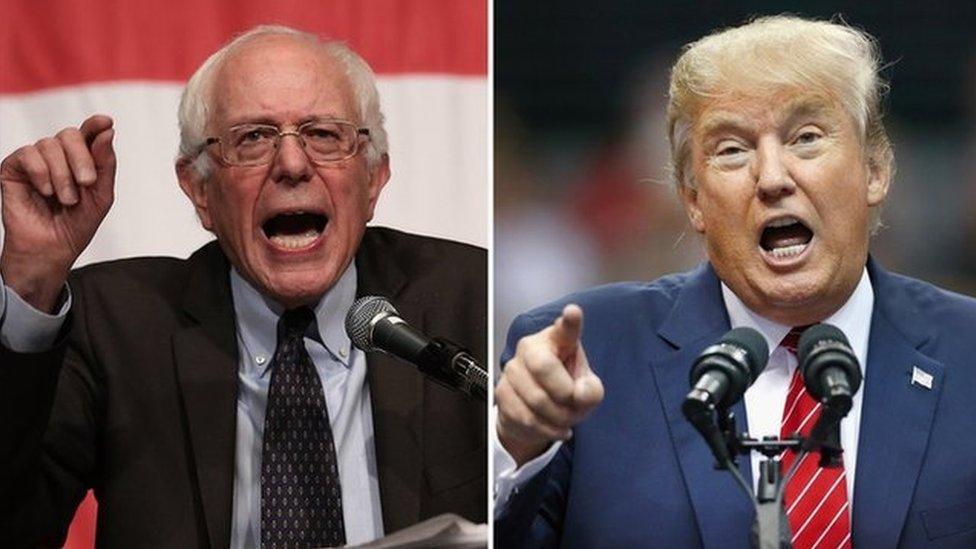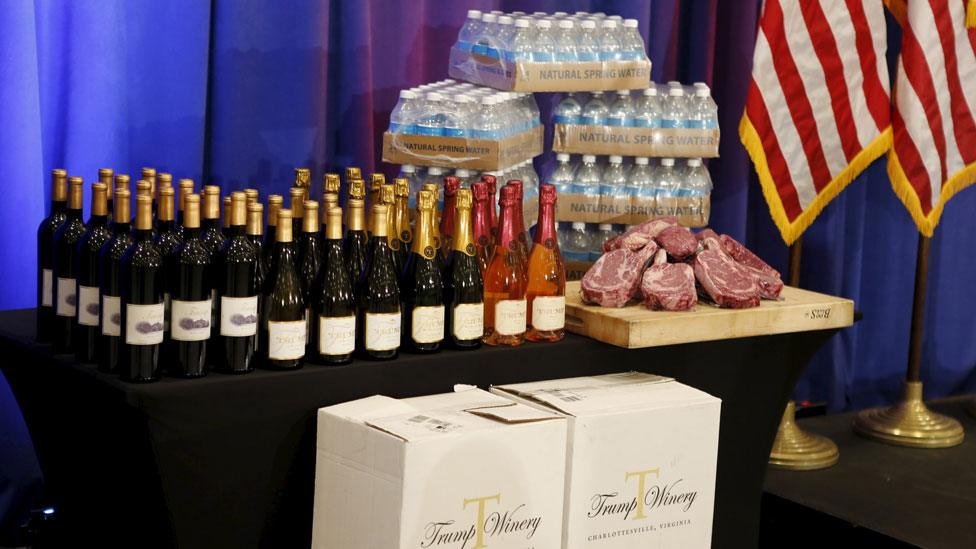US election 2016: Trump wins in Mississippi, Michigan and Hawaii
- Published

Sanders won unexpectedly in Michigan while Trump took Michigan and Mississippi
Donald Trump has won three more states, Michigan, Mississippi and Hawaii, in his bid to be the Republican White House nomination.
In the Democratic race, Bernie Sanders had a surprise victory in Michigan, but Hillary Clinton increased her overall lead with a big Mississippi win.
Ted Cruz won a Republican-only race in Idaho.
The states are the latest to choose candidates to compete in November's presidential election.
It was a terrible night for Republican Florida Senator Marco Rubio, who came in a distant fourth in both Michigan and Mississippi, a week before his must-win contest in his home state.
US media: Has Sanders changed Democratic race?
What will Americans do if Trump wins?
Election results - as they come in
Mr Trump is leading Mr Rubio in his home state of Florida 40% to 24%, according to new CNN/ORC polls.
On Wednesday, he called on the Republican party to unite behind him, after a week of stinging criticism from party leaders.
"Instead of fighting it, they should embrace it," he said.
Former Republican presidential candidate Carly Fiorina came out in support of Ted Cruz, calling him a "constitutional conservative".
"Donald Trump and Hillary Clinton are two sides of the same coin," she said at a rally in Miami. "They're not going to reform the system. They are the system."
"We're going to have to beat Donald Trump at the ballot box, and the only guy who can beat Donald Trump is Ted Cruz."

Analysis - Nick Bryant, BBC News, Detroit, Michigan
With his victories, Donald Trump has solidified his position as the Republican front-runner, withstanding a barrage of negative advertisements questioning everything from his business acumen to his use of vulgar and profane language.
Rather than deliver a conventional victory speech, the billionaire held a news conference and conducted what looked in parts like an infomercial, arguing that products that bear his name, like bottled water and wine, are commercial successes.
But it's the Trump political brand that's not only proving highly popular but also resilient to attacks from establishment Republicans who have intensified their attacks in the hope of slowing his momentum.
Showing how the normal political rules do not apply, Trump reckoned that one of the attack ads, bleeping out various swear words he's uttered during the campaign, actually boosted him because it showed that he's not bound by political correctness and tells it like it is.


The cases of Trump wine and meat were bizarre props for a victory speech
The Democratic opponent Mr Trump is most likely to face if he gets the Republican nomination, former US Secretary of State Hillary Clinton, addressed voters in Ohio after her Mississippi win.
"Running for president shouldn't be about delivering insults," said Mrs Clinton, in a thinly veiled dig at the outspoken Mr Trump.
"It should be about delivering results."

Who won where
Republican
Donald Trump: Michigan, Mississippi and Hawaii
Ted Cruz: Idaho
Democratic
Hillary Clinton: Mississippi
Bernie Sanders: Michigan

Mr Sanders' win in Michigan came as a shock after weeks of polling that suggested Mrs Clinton was well ahead.
"I am grateful to the people of Michigan for defying the pundits and pollsters and giving us their support," Mr Sanders said in a statement following his win.
"This is a critically important night. We came from 30 points down in Michigan and we're seeing the same kind of come-from-behind momentum all across America."
'No-one is more conservative than me' says Trump
Analysts say conservative firebrand Mr Cruz appears to be the only candidate capable of stopping Mr Trump, who has been fiercely attacked by the Republican establishment.
The party's 2012 nominee, Mitt Romney, described Mr Trump as a bully and a fraud who would lose a general election because of his extreme positions on immigration and Islamic State.
A central plank of Mr Trump's campaign is to deport 11m undocumented migrants and build a wall on the southern border, paid for by Mexico.
The primary and caucus elections determine the number of delegates assigned to each of the candidates.
The delegates then endorse their candidate at the party conventions in July. To secure their party's nomination, a candidate must win a majority of delegates.